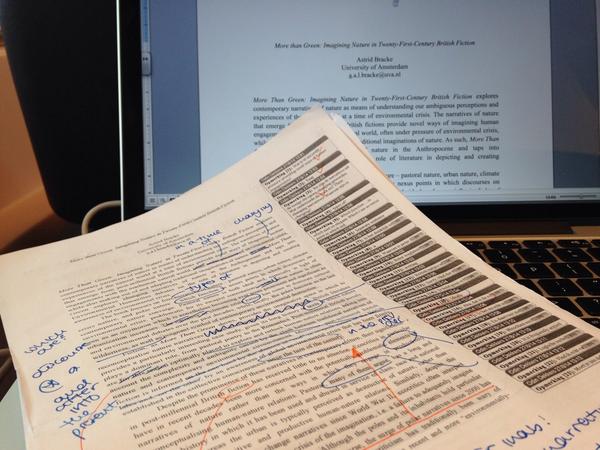 In this series of posts, Astrid Bracke writes about the process of moving from disseration to book. She has a PhD in ecocriticism and contemporary British fiction and teaches English literature at the University of Amsterdam and HAN University of Applied Sciences.
In this series of posts, Astrid Bracke writes about the process of moving from disseration to book. She has a PhD in ecocriticism and contemporary British fiction and teaches English literature at the University of Amsterdam and HAN University of Applied Sciences.
At the same time that you’re thinking about and starting work on your book proposal, you’ll also have to decide on a publisher. Although you needn’t have a definite list by the time you’re starting on the proposal – particularly since most publishers’ guidelines are so similar – it’s good to familiarize yourself as early as possible with suitable publishers and their criteria.
One question to think about is how important it is to pick a renowned publisher. Should you hold out for a prestigious publisher if that means taking years to get a contract? In the end, a book contract from a publisher that is not a top-ranking university press like Harvard or Oxford is worth more than no book contract at all. Particularly a first book will be difficult to publish with a top university press, since you will most likely not have made a name for yourself yet, while these top presses usually publish work by authors who are authorities in their fields and thereby ensure a certain level of sales.
More important in choosing a publisher are the books that the publisher publishes, and whether they’ll be able to display your monograph at conferences. Find out where the books you admire are published, and which publishers have series that match your monograph. Reviews in journals, as well as announcements on forums and listservs are also useful in this respect. It makes sense to pick a publisher that has a relevant series in your field, or which has a list broad enough for your monograph to fit in. While many authors are critical about ‘mega-publishers’ like Routledge and Palgrave Macmillan, these are often well represented at the academic conferences your intended audience attends, which is worth to take into account when making your decision.
Conferences also present a good opportunity to talk to publishers, who are often as keen to hear about your research as you are to discover whether your work fits in with their lists. In rare cases, publishers contact delegates before the conference to set up an appointment, but approaching a publisher yourself while there is also a good idea. Publishers are continually looking for new authors, and conferences are one of the ways in which they meet them.
Colleagues and others in your field can alert you to publishers and series, but may also be able to tell you about the workings of individual publishers, for instance, the quality of the editorial process, and how much work the author has to do in terms of proofreading and indexing. In all of this, you’ll also have to feel good about the quality of work published: a series might be right up your alley, but if the quality of the monographs are consistently mediocre, you need to ask yourself whether you want to publish in this series at all.
While I know people who submitted a proposal to only one publisher and immediately succeeded, it usually takes several tries. A friend recommended making lists of publishers: an A-list with the ones you’ll try first, a B-list with back-ups, and maybe even a C-list. If your book fits into several fields, research publishers in those fields, and tailor your proposal accordingly. For instance, you can tweak the market section for each publisher: while it should show your knowledge about existing work in its full breadth, referencing works that are published by the publisher you’re addressing shows how well it fits in particularly with their list.
Once you’ve decided on your A-list, and have finished the proposal, it’s time to submit. Keep in mind that while it’s acceptable to submit your proposal to several publishers at the same time, some publishers explicitly ask you for sole consideration. The academic world is a small world, publishers frequently know each other, and peer reviewers are often asked by several different publishers, making it a real possibility that the publisher discovers if you’re cheating – so don’t.
The time it takes for a publisher to review your proposal varies, and you can always ask: a commercial publisher I recently talked to said that it took them two months from submission of the proposal to decision. Finally, never, unless a publisher specifically asks for it, send your entire manuscript: while publishers want to know as precisely as possible what you are planning to do with your monograph, they also want to know that you can still tweak or adjust things if the peer reviewers suggest it.



















 Image from: http://www.flickr.com/photos/pumpkincat210/with/3416918382/
Image from: http://www.flickr.com/photos/pumpkincat210/with/3416918382/ 


